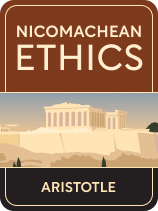

This article is an excerpt from the Shortform book guide to "Nicomachean Ethics" by Aristotle. Shortform has the world's best summaries and analyses of books you should be reading.
Like this article? Sign up for a free trial here .
What’s happiness? What does reason have to do with it? How is virtue a factor?
Aristotle concedes that many people agree with him that happiness is the goal of human life. The real challenge is defining happiness. He defines it as rational activity aligned with virtue.
Keep reading to understand Aristotle’s definition of happiness.
Defining Happiness
To explain Aristotle’s definition of happiness, we’ll look at each of its parts: reason, virtue, and activity.
Reason
Aristotle claims that, to judge how good something is, you need to know its “defining activity”: what it (and only it) does. For example: Saying someone is a “good” violin player is a judgment of their ability to play the violin—the activity that a violin player (and only a violin player) does.
Reason (the ability to think logically and make choices based on that logic) is the defining activity of humans. All of our other actions aren’t unique to us. To list a few: Our ability to move, reproduce, fulfill basic needs, or perceive the world around us are also things that other animals (and in some cases, plants) can do.
However, no other animal or plant can think logically or make logical decisions. Humans (and only humans) can do that. This makes reasoning our defining activity, and, therefore, the standard we can use to judge how good a human is. A good human is good at reasoning. A good human, by definition, lives a good life—and a good life is a happy life. Therefore, reason is necessary for happiness.
| Reason as the Goal of Human Life Aristotle’s Metaphysics provides context for his argument that everything has a “defining activity.” In Metaphysics, Aristotle explains that everything has four “causes” that define it: Material cause: what the thing is made out of. For example, the material cause of a clock is the metal and glass it consists of. Efficient cause: how the thing came into being. For example, the efficient cause of a clock is the clockmaker that built it. Formal cause: the shape or structure of a thing. For example, the formal cause of a clock is the design of its gears, face, and hands. Final cause: what the thing exists for—its end or goal. For example, the final cause of a clock is to tell time. Aristotle claims that the final cause is the most important—it provides the purpose behind every other cause. For example, a clockmaker (the efficient cause) gathers metal and glass (the material cause) and shapes them into gears, a face, and hands (the formal cause) all so he can create a clock that tells time (the final cause). Therefore, to define humans (and then define a good human life) Aristotle says he must find our final cause—what we exist to do. This must be what we uniquely do—a non-unique activity won’t specifically define humans and a good human life. For example, all living beings reproduce. Therefore, we can say that a human with 10 children is a good living thing—but we can’t say if they are a good human or not. When Aristotle says our final cause is to reason, he both defines what it means to be human and what it means to be a good human—a human reasons, and a good human reasons well. |
Virtue
Aristotle cautions that reasoning alone isn’t enough to be happy—it also must be correct reasoning. Someone who always makes the worst possible decisions won’t live a happy life even though they are using reason (albeit poorly).
What Aristotle means by correct reasoning is reasoning aligned with “virtue.”
(Shortform note: “Virtue” is the typical English translation of the ancient Greek “arete,” which also translates to “excellence.” This means that when Aristotle discusses “reason aligned with virtue,” he’s essentially saying “excellent reasoning.”)
Since “reasoning” means making choices, “reason aligned with virtue” means making the right choices. If we make the right choices in life, it means we’re good at reasoning—and are therefore happy.
Aristotle separates virtue into two main categories:
- Moral virtues: The virtues that define what decision is “right” in social interactions and, by extension, determine what it means to do the right thing or be a good person. Examples of moral virtues include justice, courage, and temperance.
- Intellectual virtues: These virtues are different types of knowledge that allow us to make the right decisions and excel at certain skills. For example, an excellent carpenter has the intellectual virtue of technical knowledge—knowledge that allows him to make the right decisions in his work and create good furniture.
(Shortform note: Critics note that Aristotle doesn’t explain why moral decisions are the “right” ones to make or how they contribute to a well-lived life. For example, Aristotle suggests that being courageous and doing courageous things is the “right” thing to do, but never actually explains why or how it makes a person happy. Some scholars suggest that Aristotle believes these questions are beyond the scope of ethics; others claim that his intended audience is people who are already morally virtuous. This ambiguity contrasts with intellectual virtues, which clearly benefit us and lead us to make the “right” decisions. For example, a carpenter with the virtue of technical knowledge will make good carpentry decisions and create better furniture.)
Activity
Reasoning aligned with virtue still isn’t enough for happiness—a person also must consistently act on this reasoning. Goodness, explains Aristotle, can’t exist separate from objects or actions—it makes no sense to call a carpenter good if he’s never built anything, for example. Therefore, action is necessary for a good life.
However, one or a few actions isn’t enough. Aristotle claims happiness requires consistently good actions over an entire lifetime).
(Shortform note: By claiming that goodness can’t exist separately on its own, Aristotle is arguing against his teacher Plato. In works like the Republic, Plato argues that there’s an ideal, eternal “form of the good” that exists independent of anything else. This form of the good explains why any particular thing is good—it’s a universal standard to define goodness. Aristotle has multiple arguments against the form of the good, mostly centered on the idea that a universal definition of goodness is too broad. By arguing that happiness comes from specific actions, Aristotle insists that a good (and therefore happy) human isn’t one that exists according to an abstract ideal of goodness and, therefore, argues against Plato’s theory.)

———End of Preview———
Like what you just read? Read the rest of the world's best book summary and analysis of Aristotle's "Nicomachean Ethics" at Shortform .
Here's what you'll find in our full Nicomachean Ethics summary :
- Aristotle's philosophies on topics such as happiness, virtue, and wisdom
- What it means to be morally virtuous and how someone can develop moral virtue
- How wisdom contributes to the possibility of a happy life






